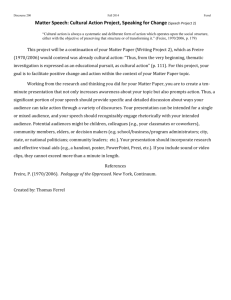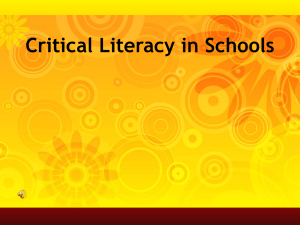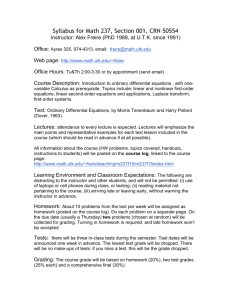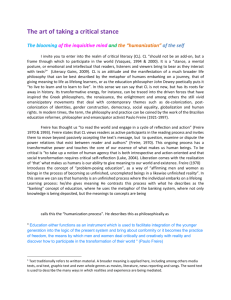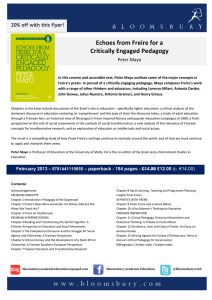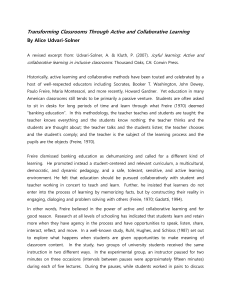BOOK REVIEW Freire London: Routledge, ISBN-13: 978-0415538404 ISBN- 10: 0415538408 2014, 198 pages.
advertisement
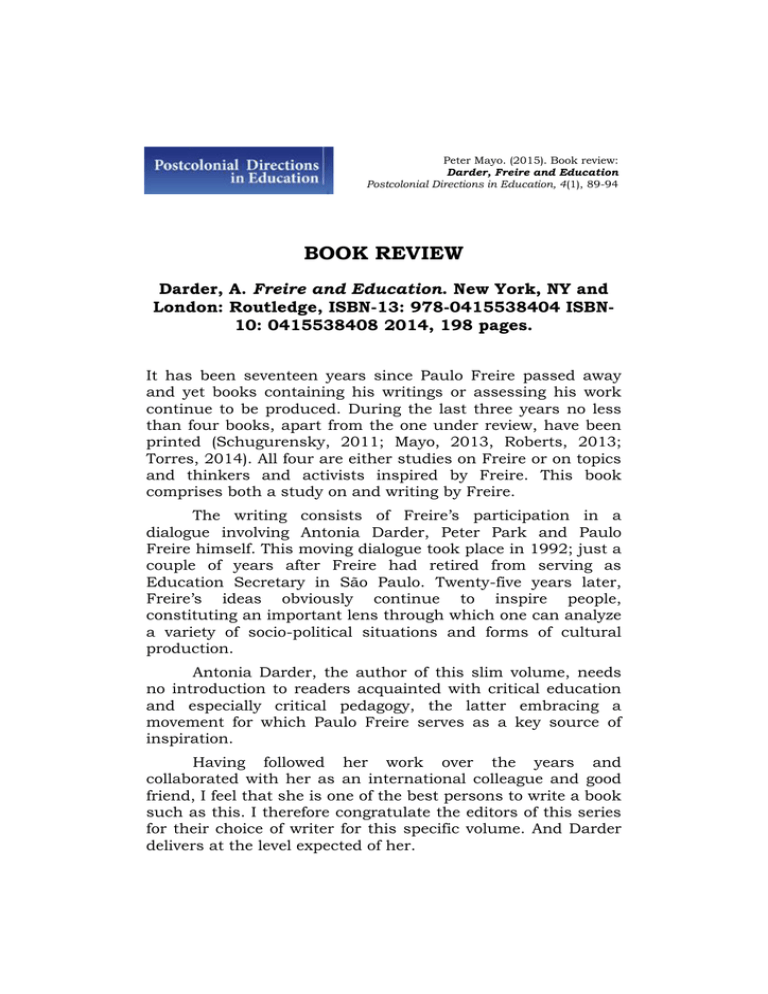
Peter Mayo. (2015). Book review: Darder, Freire and Education Postcolonial Directions in Education, 4(1), 89-94 BOOK REVIEW Darder, A. Freire and Education. New York, NY and London: Routledge, ISBN-13: 978-0415538404 ISBN10: 0415538408 2014, 198 pages. It has been seventeen years since Paulo Freire passed away and yet books containing his writings or assessing his work continue to be produced. During the last three years no less than four books, apart from the one under review, have been printed (Schugurensky, 2011; Mayo, 2013, Roberts, 2013; Torres, 2014). All four are either studies on Freire or on topics and thinkers and activists inspired by Freire. This book comprises both a study on and writing by Freire. The writing consists of Freire’s participation in a dialogue involving Antonia Darder, Peter Park and Paulo Freire himself. This moving dialogue took place in 1992; just a couple of years after Freire had retired from serving as Education Secretary in São Paulo. Twenty-five years later, Freire’s ideas obviously continue to inspire people, constituting an important lens through which one can analyze a variety of socio-political situations and forms of cultural production. Antonia Darder, the author of this slim volume, needs no introduction to readers acquainted with critical education and especially critical pedagogy, the latter embracing a movement for which Paulo Freire serves as a key source of inspiration. Having followed her work over the years and collaborated with her as an international colleague and good friend, I feel that she is one of the best persons to write a book such as this. I therefore congratulate the editors of this series for their choice of writer for this specific volume. And Darder delivers at the level expected of her. Postcolonial Directions in Education She critically fuses some of the most important concepts in Freire’s work with insights from her own biographical accounts, interspersed throughout this expository and, at the same time, analytic text. She is an established thinker in her own right, whose work reflects the pain, joys and struggles of her own life as a Puerto Rican woman who survived a rough and turbulent upbringing as part of an impoverished and ruthlessly colonised social class (see her revealing account in an interview in Borg and Mayo, 2007 and in Darder, 2011). Antonia Darder also deeply embodies the freirean spirit throughout. Reading through this volume and knowing her personally, I felt that this book is as much about Freire as it is about Darder herself. Her particularly heartfelt engagement with the main themes around which the discussion at hand is organised, namely Liberation. Love, Conscientização and Problematizing Diversity, immediately recalls the various writings which have rendered her, in my estimation, and I am sure that of many others, one of the USA’s leading voices of ‘freedom through social justice.’ As always, the writing is imbued with passion - great passion and exudes a strong sense of love and commitment to the plight of the oppressed. She underlines in the book, echoing Freire, as well as revolutionaries such as Ernesto Che Guevara, that this sense of love is the hallmark of all genuine educators and revolutionaries. I confess that, in my early years of reading and writing about Freire, initially as a graduate student and subsequently academic, I erroneously and misguidedly tended to give short shrift to the concept of love. I focused more on the ‘intellectually appealing’ notions of dialectical relations, praxis, conscientização etc. Make no mistake, all of these concepts deriving from social theory, and many more, are present throughout Darder’s work, with strong elaborations and reinventions in contemporary contexts. It was, however, in reading Darder’s earlier book on Freire, aptly subtitled A Pedagogy of Love, and Paula Allman’s work, that I came round to embracing one of the key aspects of Freire’s pedagogy which from then on became the staple of my own thinking and writing on education. I acknowledge this 90 Vol. 4, No. 1, 2015. in the first chapter of my book Liberating Praxis (Mayo, 2004; 2009). In short, I partly owe this to Antonia! In my view there are both Christian (Christianity was a great fount of inspiration to Freire, whatever others might say or the means by which they try to play this down) and revolutionary overtones in Freire’s concept of love. As Darder is at pains to point out, a Freirean approach to knowledge is not concerned solely with the cognitive aspects of learning (Darder, 2002, p. 98). It involves conceiving of the educators and learners as “integral human beings” (Ibid, p. 94) in an educational process that has love at its core. Freire was reported to have said a few days before he died: I could never think of education without love and that is why I think I am an educator, first of all because I feel love” (in McLaren, 2002). For Darder, a point made previously in her 2002 Freire book, the central pedagogical process of dialogue cannot exist in the absence of a profound love for the rest of humanity and other species. It is therefore from this love that, Freire felt, teachers could derive the strength, faith and humility to acquire the solidarity and engage in the struggle necessary to transform the oppressive ideologies and practices of public education. (Darder, 2002, pp. 91-92) A key point stressed by Darder throughout this book is that, by extending the pedagogical approach well beyond the simply cognitive, Freire bequeathed to us a legacy that foregrounds the relationship between love, the body and knowledge. The thoughtful discussion around these interrelated aspects of learning together (collective learning, a dimension of learning which both Freire and Darder underscore) is one of the most inspiring in the book. She writes of a critical praxis of the body and elaborates on this particular aspect of moral regulation and control with which we have to contend throughout our lives. The dichotomy between mind and body is a false one in both Freire and Darder’s view, as banking education in its worst and all embracing forms has much to do with control of the body, ideas and imagination. Philip Corrigan (1991) captured the whole process brilliantly in a title of a paper he 91 Postcolonial Directions in Education wrote: ‘The Making of the Boy. Meditations on what Grammar School did With, To and For My Body.’ A pedagogy of / for liberation is a pedagogy for a liberation of total integral human beings, a liberation of mind, soul, spirit and body carried out, as Freire underlines, not on one’s own but in concert with others. Otherwise there is the danger that one would be liberating’ oneself at the expense of others, thus simply replacing the oppressor rather than bringing an end to the ‘oppressor-oppressed’ contradiction of opposites, opposites that are not to be perceived as binaries as they exist in a dialectical relationship. These are just some of the many aspects and concepts from Freire tackled and powerfully elaborated throughout Freire and Education. Quite important is the discussion on difference conceived as existing within the totalizing structuring force of global capitalism, a recurring theme in Darder’s work. The book however provides us with the added bonus of a three way discussion involving Paulo Freire himself, a favourite means through which Freire would convey many of his ideas (see his many ‘talking books’). This discussion raises issues around the quest for struggling coherently within hegemonic structures in a country, such as the USA, which is not liberating in so far as its traditional official line of politics is concerned, very much felt by a Brazilian and a Puerto Rican who have been born and raised on the receiving end of USA direct (Puerto Rico) and indirect (Brazil and the rest of Latin America) colonialism. The issue of coherence and the struggle to be less contradictory and therefore more ethical is a recurring theme throughout, as is the point, resonating with many, that, despite all the difficulties and contradictory class locations we experience, some of us have a political platform from which to make our voice heard. It would be criminal not to use it. Our privilege as critical scholars and tenured academics, despite all the concerns about the way academics are increasingly under assault to be rendered vulnerable and powerless, comes at a price, necessitating a duty. It is our duty to use any platform we have to speak truth to power, something which Freire did throughout his life, at one stage paying a heavy price for it. 92 Vol. 4, No. 1, 2015. I can attest that Antonia Darder has, for years, been speaking truth to power. As is often the case, she and others have been doing this with the support of some (alliances and kindred spirits are key), but also with the astonishing lack of support from others for whom radical posturing is exactly what it is, posturing for career advancement in fields such as critical education and cultural studies which superficially appear to some as simply ‘hip.’ These very same people are the ones who deny solidarity just when it is most needed. They sound radical or progressive in the lecture hall or other public forums but then act non-radical and conservative when dealing with the powers that be or serving on or contending with administrative bodies. Yet, it is the very need for problematizing the contradictions faced daily in our lives as subaltern educators and activists, that most speaks to the powerful manner in which Freire and Education reignites Freire’s pedagogy of love and its contribution to the transformation of schools and society. This is indeed a lovely, thought-provoking and inspiring book! Peter Mayo University of Malta References Borg, C and Mayo, P (207) Public Intellectuals, Radical Democracy and Social Movements. A Book of Interviews, New York and Frankfurt: Peter Lang. Darder, A (2002) Reinventing Paulo Freire. A Pedagogy of Love, A. Darder, Westport Connecticut: Westview Press. Darder, A (2011), A Dissident Voice. Essays on Culture, Pedagogy and Power, New York and Frankfurt: Peter Lang. Corrigan, P R D(1991). The Making of the Boy. Meditations on what Grammar School did With, To, and For My Body. In Giroux, H.A (Ed.) Feminism and Cultural Politics. Redrawing Educational Boundaries, Albany: SUNY Press. McLaren, P. (2002) Afterword. A legacy of hope and struggle, In A. Darder, Reinventing Paulo Freire. A Pedagogy of Love, Westport Connecticut: Westview Press. Mayo, P (2004; 2009) Liberating Praxis. Paulo Freire’s legacy for Radical Education and Politics, hbk, 2004, Westport 93 Postcolonial Directions in Education Connecticut: Praeger; pbk 2009, Rotterdam, Boston and Taipei: Sense Publishers. Mayo, P (2013) Echoes from Freire for a Critically Engaged Pedagogy, London and New York: Bloomsbury. Roberts, P (2013) Paulo Freire in the 21 st century. Education, Dialogues and Transformation, Boulder Colorado: Paradigm Publishers. Schugurensky, D(2011), Paulo Freire, London and New York: Continuum. Torres, C. A (2014) First Freire Early Writings in Social Justice Education, New York: Teachers College Press. 94
